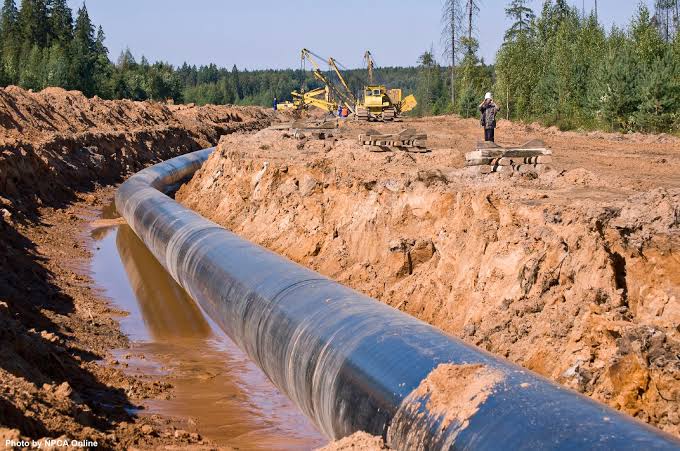 The construction of the East African Crude Oil Pipeline, commonly referred to as EACOP, has reached a significant milestone, with project developers confirming that approximately 60 percent of the work has been completed. This progress comes amid continued resistance from international environmental organizations, climate activists, and some financial institutions that have criticized the project for its potential environmental and social impact.
The construction of the East African Crude Oil Pipeline, commonly referred to as EACOP, has reached a significant milestone, with project developers confirming that approximately 60 percent of the work has been completed. This progress comes amid continued resistance from international environmental organizations, climate activists, and some financial institutions that have criticized the project for its potential environmental and social impact.
Stretching over 1,400 kilometers from oilfields in western Uganda to the Tanzanian port of Tanga on the Indian Ocean, the pipeline is poised to become the longest heated crude oil pipeline in the world once completed. It is a joint venture between the governments of Uganda and Tanzania, along with TotalEnergies, a French oil and gas company, and the China National Offshore Oil Corporation (CNOOC). The project represents a critical step for Uganda as it seeks to commercialize its oil reserves, first discovered in the Albertine Graben in 2006.
Officials from the Uganda National Oil Company and other project partners have stated that construction is proceeding according to plan, with major infrastructure such as camps, access roads, and pipeline segments already in place. They emphasized the economic potential of the project, projecting billions of dollars in revenue and thousands of jobs for local communities in both Uganda and Tanzania.
Proponents argue that the pipeline is key to unlocking Uganda’s oil potential and transforming the country’s economy. They also stress that the project includes extensive environmental and social management plans designed to mitigate harm to ecosystems and communities along the route. In addition to direct oil revenues, governments expect infrastructure development, increased foreign investment, and regional energy cooperation to be long-term benefits of the project.
However, international criticism has intensified in recent months, particularly from climate advocacy groups and non-governmental organizations. Opponents argue that the pipeline threatens fragile ecosystems, including biodiversity-rich areas near Lake Victoria and Murchison Falls National Park. They warn that it risks displacing thousands of people and increasing carbon emissions in a region already facing the effects of climate change.
Several global financial institutions have withdrawn their support or publicly distanced themselves from EACOP. Major banks and insurers, including Barclays, Credit Suisse, and Munich Re, have declined to fund or underwrite the project, citing environmental, social, and governance (ESG) concerns. These decisions have led to delays in financing, although project backers insist that alternative sources of capital, particularly from China and regional development banks, have kept the project on track.
Despite these objections, Uganda and Tanzania have remained firm in their support of the pipeline, framing the criticism as unfair and sometimes neocolonial. President Yoweri Museveni of Uganda has repeatedly dismissed international outcry as an attempt to deny African nations their right to develop their natural resources. He argues that while developed nations have long relied on fossil fuels for growth, African countries are now being told to abandon their energy potential in the name of global climate goals.
Tanzanian authorities have echoed this sentiment, emphasizing their commitment to environmental stewardship while also prioritizing national development. They have highlighted job creation, improved infrastructure, and local content requirements as positive outcomes of the project, particularly for rural communities that have long been underserved.
The pipeline has also become a lightning rod in broader debates about Africa’s place in the global energy transition. While international agencies push for a shift toward renewable energy, many African leaders argue that the continent must be allowed to use its oil and gas reserves to fight poverty and build modern economies. They contend that energy justice and development equity must be central to global climate conversations.
Communities along the pipeline route have shown mixed reactions. While some residents have welcomed compensation payments and job opportunities, others have reported delays in payments, inadequate resettlement packages, and a lack of meaningful consultation. Human rights organizations have documented cases of intimidation against critics of the project, raising concerns about freedom of expression and civic space in areas affected by construction.
TotalEnergies has maintained that it is following international standards in the implementation of EACOP, pointing to environmental impact assessments and community engagement programs. The company insists that the pipeline will be among the most modern and environmentally responsible of its kind, incorporating advanced leak detection systems and safety measures.
As construction moves closer to completion, the debate around EACOP is expected to intensify. The project has become a symbol of Africa’s struggle to balance development with environmental sustainability and climate responsibility. While the governments of Uganda and Tanzania view it as a legacy infrastructure investment, global opponents warn that it may become a stranded asset in an increasingly carbon-conscious world.
The pipeline is projected to be fully operational by 2026, with Uganda expected to begin exporting crude oil soon after. The next phases of the project will involve finalizing remaining pipeline sections, completing oil processing facilities, and addressing ongoing legal and financial hurdles. For now, the East African Crude Oil Pipeline remains both a symbol of hope for economic transformation and a focal point of one of the continent’s most contentious energy debates.

